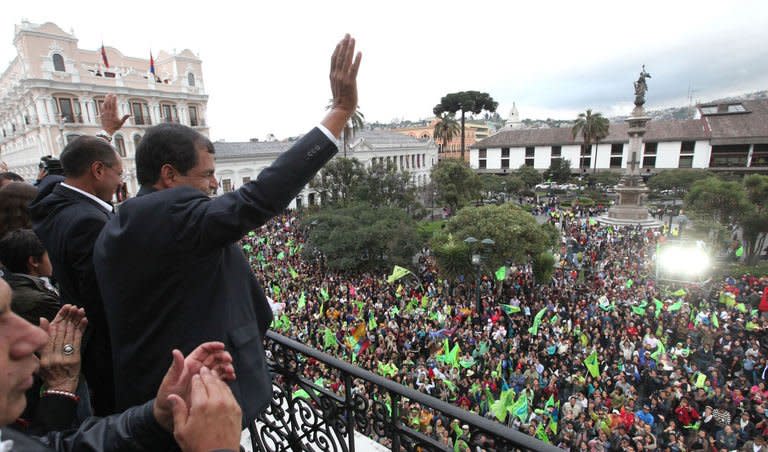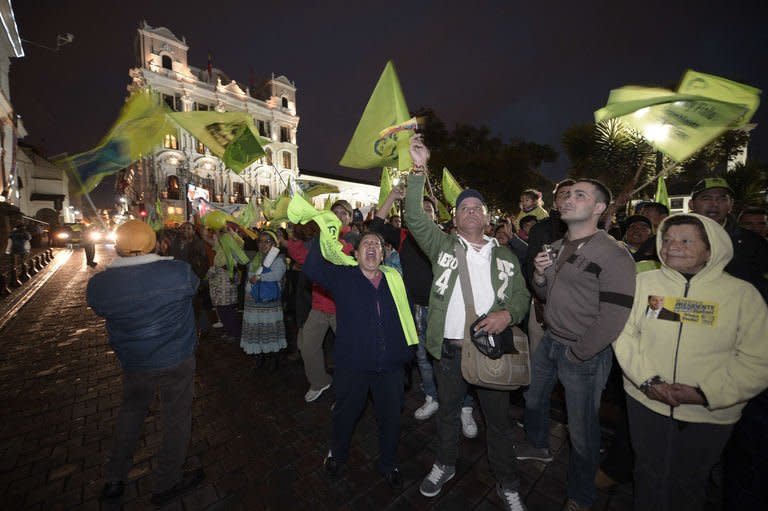Ecuador's Correa eyes broader change after re-election
Fresh from a landslide re-election victory, Ecuadoran President Rafael Correa is hoping to follow up with the sweeping legislative win needed to clear the way for deeper socialist changes. If the leftwing activist can secure an absolute majority in Ecuador's National Assembly he would have free rein to regulate the media, redistribute land and make other controversial changes. The election process for the 137 assembly seats up for grabs is complex, and it was unclear early Tuesday how long it will take before definitive results are in, but polls suggest Correa will achieve his goal. "Nobody is going to stop this revolution. We are making history," Correa told a crowd from the balcony of the presidential palace on Sunday, after clinching a new four-year term, his third and constitutionally his last. "We are building our small homeland, and a larger one, too," he said, referring to Latin America as whole. With 71 percent of the ballots counted in the oil-exporting Andean nation, Correa was ahead with nearly 57 percent of the vote, compared to banker Guillermo Lasso's 23.1 percent. "Thank you for this majority. The first thing we are going to do is unblock progress on fundamental legislation," Correa told Telesur television. Lasso, who served as finance minister during an economic crisis in the 1990s, conceded defeat shortly after the results were announced. Citizen Participation, a non-governmental organization authorized by poll authorities, projected that Correa's Alianza Pais would win 90 seats, or 66 percent, and Lasso's Creating Opportunities movement 12 seats in the legislative polls also held Sunday. In the mold of Venezuela's Hugo Chavez, the 49-year-old Correa is one of a group of leftist leaders who have shaken up Latin America in recent years with populist and often defiantly anti-US policies. Correa dedicated his victory to Chavez, who made a surprise return home from Cuba overnight after 70 days in Cuba convalescing from cancer surgery. He wished the Venezuelan a speedy recovery, saying: "Venezuela, your beloved Latin America and we, your friends, all need you." In power since 2007, Correa has taken on big business and media groups, imposed new contracts on oil companies and renegotiated the country's debt while touting his poverty reduction efforts. His clashes with the media have drawn sharp criticism from international rights and press groups. Yet Correa has vowed to forge ahead with a new communication law that would redistribute radio and television frequencies and tighten regulations. "We are going to try to make this an honest press, because there is a corrupt press here that is in the hands of a few families who think they can say whatever they want because they have a printing press," he warned. Many analysts, however, believe that Correa, an economist with degrees from Belgium and the United States, will make practical moves to ensure the country is developing. "I think Correa has been practical, and will remain so; in his first term he made concessions to the business community in order to get some support from them, and I think he will continue to do this," said Mark Weisbrot, co-director of the Center for Economic and Policy Research in Washington. "He is not trying to create a centrally planned economy, or one dominated by state ownership of industry or commerce; so private businesses will continue to have an important role," he stressed. Still, some say Correa's promotion of hefty public spending -- which reached 15 percent of GDP in 2012 -- may be not be sustainable in the long run. "Although the strategy makes the president personally popular, particularly amongst the country's poorer constituents, it may prove unsustainable if oil revenues fall," said Arthur Dhont of the IHS institute. Last year, Correa irritated Britain and the United States by granting asylum to WikiLeaks founder Julian Assange -- who is wanted for questioning in Sweden over sexual assault allegations -- at Ecuador's embassy in London. He broached the issue again Sunday by calling on Europe to quickly resolve the fate of Assange, who has been holed up at the embassy for eight months. British Foreign Minister William Hague said London remains "remains fully committed to seeking a diplomatic solution" with Quito on securing Assange's extradition to Sweden. Critics accuse Correa of scaring away foreign capital, though he has been more pragmatic than some of his allies elsewhere in the region. Although soundly defeated, Lasso emerged from the elections as the most credible opposition candidate in a crowded field that included an ousted former president and the country's richest man. "From zero, we've gone to being the second political force in Ecuador," Lasso said. "And now we have more than a quarter of the population supporting us, I have no doubt we will become the country's first political force." Correa acknowledged that the election had helped consolidate the opposition. "We have to organize ourselves better because the forces that oppose this project are going to organize more to stop it," Correa told a rally of frenzied supporters. "If we don't change Ecuador now, we never will." About 30 percent of Ecuador's 15 million people live below the poverty line, and Correa's social programs have won him support from the Galapagos islands to the Pacific coast, up the towering Andes and down to Amazon basin.




